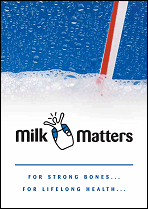Classroom Lessons Reinforce Messages About the Importance of Calcium for Bone Health

Calcium is important throughout life for strong bones and a healthy body, particularly during the ages of 11 to 15, the years of rapid bone growth. But with fewer than one in 10 girls and only one in four boys ages 9 to 13 at or above their adequate intake of calcium, many young people are not getting the calcium they need to build strong bones now and to prevent osteoporosis later in life.
The NICHD’s Milk Matters calcium education campaign released new online resources for teachers that feature fun, hands-on classroom lessons created to teach tweens (kids ages 9 to 12) and teens about the importance of calcium for bone health. They are the latest addition to the Milk Matters campaign, which also features information and materials for parents and health care providers.
“Teachers play an important role in raising awareness about healthy behaviors,” said NICHD Director Duane Alexander, M.D. “The Milk Matters Web resources offer support to teachers so that they can deliver evidence-based messages about the importance of calcium for bone health to tweens and teens, age groups that often don’t get enough calcium to meet their needs.”
Using calcium lessons, fact sheets, take-home assignments, and classroom discussion, the Milk Matters online lesson resources are designed to help students understand the importance of making smart food choices. In The Great Calcium Challenge, students learn to read nutrition facts labels and calculate their calcium intake. The Calcium Collector includes a game in which students choose combinations of foods to provide 1,300 mg of calcium—the daily recommended intake for their age group. Both lessons also reinforce students’ math skills. The Smart Snack Cookbook gives students an opportunity to create a recipe book of simple, healthy snacks, such as fruit smoothies.
The lesson resources also include a lactose intolerance discussion guide to help teachers discuss the symptoms of lactose intolerance and ways for reducing them. All of the materials are consistent with National Health Education Standards.
The Milk Matters campaign recognizes low-fat or fat-free milk as an excellent source of calcium because:
- Milk has a high calcium content in a form the body can easily absorb.
- Milk contains other nutrients—including vitamin D, vitamin A, vitamin K, riboflavin, B12, potassium, magnesium, and protein—that are essential to healthy bone and tooth development.
- Milk is widely available and is already a part of many people’s diets.
The Milk Matters Web site offers a variety of free materials for parents, health care providers, and now teachers that emphasize the importance of calcium in the diets of children and teens. Many of these materials are available in both English and Spanish. For more information, check out the following resources:
- Milk Matters Web site
- Complete listing of all Milk Matters materials and publications (to view, download, or order)
Originally Posted: September 28, 2007

 BACK TO TOP
BACK TO TOP